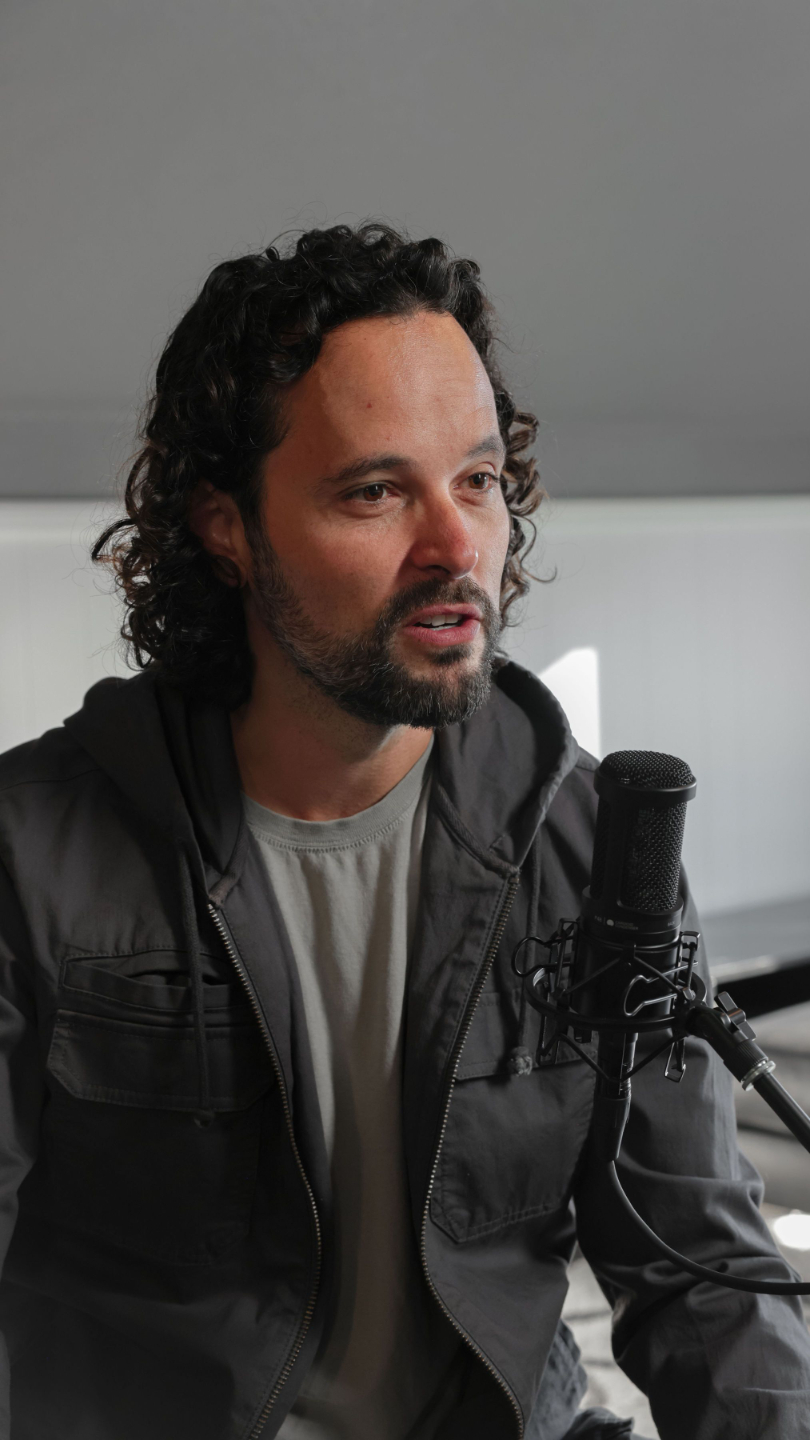100 Ways to Love Your Wife—And Why None of Them Will Work Until You Do This
The Book That Should Have Saved My Marriage—But Didn’t
Back when I was a firefighter and my marriage was really struggling, I remember being at the firehouse flipping through a little book that I bought called A hundred Ways to Love Your Wife.
It was simple. One page, one action, one explanation of why it mattered. And back then that's what I thought. I needed a manual, a checklist, a way to fix things. So I'd pick one, maybe write her a note, plan something thoughtful, and I'd commit. I'd tell myself, when I get home from this 48 hour shift, I'm going to love her better.
But then I'd walk through the door and everything would collapse. I'd get irritated, closed off. I'd look around the house for something to fix. Not in the marriage, but like literally fix. And before I knew it, I was back in the same pattern. Distant, short, defensive, the guy I promised myself, I wouldn't be.
Why Trying Harder Doesn't Work
Maybe you've done something like that. Maybe you've bought the book, listen to the podcast. Like this one tried the thing, you had the right intention, but when the moment came, it didn't work, and you were left wondering, what's wrong with me? Why can't I follow through?
Well, today I'm going to tell you exactly why it didn't work for me, why it hasn't worked for you, and the one thing that does work, the thing that actually allows all the other tools, books, scripts, and strategies to get through and stick. We're going to talk about the part of you that sabotages connection, and we'll talk about how to shift into the part of you that can lead your marriage with strength, presence, and love.
If you've ever felt like something inside you keeps getting in the way of the husband, you want to be stick around. This might be the turning point.
Welcome to Better Husband, the podcast that helps you answer the question, how can I be a better husband? I'm Angelo Santiago, a men's marriage and relationship coach, and every week I bring you practical insights to help you strengthen your marriage and become the best husband you can be.
So back to my story. Like I said, I kept trying. Every time I left home for one of my shift, I put that book back in my bag, and every time I came home, I'd fail to follow through.
And the part that hurt the most wasn't just how it made her feel, it was how it made me feel. I felt ashamed, I felt confused, like I knew better, but I couldn't do better. And it would hit me in these quiet moments of clarity, driving back to the station or sitting in my bunk at 2:00 AM asking myself, why is this so hard?
Why can't I just be the man I want to be for her?
Why You Keep Showing Up as the Wrong Version of You
What I didn't understand back then was that there are two versions of me. There was the part of me that was reading that book, that part, that wanted to love, well, that wanted to be a better husband.
But there was also a part of me that got reactive, that shut down, that defended that focus on tasks instead of connection. And that part. Was the one that was showing up the moment I walked through the door and until I learned what that part was, until I got help, understanding where it came from, how it was built, and how to unhook from it, nothing changed.
And this is the part most men miss. Here's what I wish someone told me back then. There's a part of you that was built to protect, not to connect, and that part is what's running the show when things get hard in your marriage. In relational life therapy, we call it the adaptive child, but you don't need the label.
Just think of it as the version of you that shows up when you feel overwhelmed, criticized, disrespected, or not enough. He's fast, he's sharp. He's the one who snaps, withdraws, fixes, lectures, avoids. And he learned those moves a long time ago. Not in your marriage. In your childhood. This is the part of you that kept you safe when you were young.
Maybe you had a parent who is unpredictable, so you got quiet. Maybe you were praised for being helpful or strong, so you became the one who didn't have any needs. Maybe you were punished or ignored when you showed emotion, so you stopped showing it whatever the case, that version of you adapted to survive.
And so he did his job, he got you through. But here's the problem. That same part of you, he doesn't know how to love. He only knows how to protect. So when your wife is upset, when you feel like you're being blamed or not appreciated or misunderstood, he shows up, he takes the wheel, and suddenly you're reacting, shutting down, getting angry or trying to fix everything just to get out of the discomfort.
Because that adaptive strategy, that adaptive version of you, is still running the show. And here's the worst part, you might not even notice when it happens. You just feel tense on edge, ready to prove or defend or disappear. That's what happened to me. Every time I walked through that door with my book full of good intentions, it didn't matter because my adaptive strategies had already taken over and as long as he was running the show, nothing I did from the book was going to land the way I hoped it would.
That's the pattern I want you to see, because once you see it, you can start to interrupt it. You can learn to pause, you can bring a different part of you forward, because this is the part that most men get wrong. We think if we just knew more, we'd do better. So we read the books, we watch the videos, we memorize the script.
So we come into the moment thinking, all right, I've got this. I know exactly what to say. I. But when the pressure hits, when emotions are high, when your wife is hurt or mad or asking for something you don't know how to give, you don't go to the script, you go to the strategy you've always used, you shut down, you defend.
You talk fast or say nothing, and try to end the conversation as quickly as possible. Because when you're in that reactive state, the part of your brain that stores all those helpful tools, the podcast advice, the marriage book, the coaching session, it goes offline. Literally, you're not in relational mode anymore.
You're in survival mode. That's why knowledge isn't enough. You could be the most informed man on the planet about how to love your wife and still make her feel unseen, unheard, unimportant. Not because you don't care, but because the part of you that does care, the wise adult part of you is not the one leading in the moment.
This is the trap so many men fall into. We gather information, we stack the tools. We convince ourselves I should be able to do this by now. And when we don't, we spiral into shame. We say things like, maybe I'm just not cut out for this, or Maybe this marriage just can't be fixed. Or We blame if only she didn't do this or that, or why does she always have to be so emotional?
What's happening is that you're trying to operate relationally while being run by your adaptive strategies, and that never works. Which brings us to the part of you that can lead, the part that can use those tools. The part that changes everything. Let's go there next.
The Part of You That Can Actually Love Her
So let's talk about the part of you that can actually create change. The part that can stay grounded, the part that can listen without defending love, without performing lead, without controlling. We call this your wise adult self and he's already in you. You've seen glimpses of him. He's the version of you that shows up for a hurting friend.
The version that's calm under pressure when someone else is in crisis. The version that pauses breathes and chooses connection over control. You've been him before, but the difference is he's not automatic. He has to be practiced. He has to be invited into the moment because the adaptive child, he shows up on reflex.
But the wise adult, you have to choose him. That means doing the work before the moment of conflict hits. It means building awareness of your patterns. It means regulating your nervous system so you're not just reacting to every trigger. It means asking yourself, what does this moment really call for?
What would love do here? What would the man I want to be, choose right now? It's all about building the muscle of presence, and here's the good news. The more you bring the wise adult forward, even for five seconds, even for one breath, the more natural he becomes. Over time, you'll catch yourself. Before the shutdown, you'll notice the impulse to defend and choose to stay open.
Instead, you'll hear your wife's frustration and listen without making it about you. That's the shift. That's what unlocks the tools. You already have, not more knowledge, but a different version of you using that knowledge and that wise adult. He's not afraid of hard conversations. He's not scared of his wife's emotions.
He doesn't need to win. He wants to connect and that's the part of you your marriage is waiting for, and that's the part we're going to strengthen.
Where You Learned to Shut Down and How to Break That Cycle
But first we need to understand where the other part came from, the part that keeps hijacking your intentions because you didn't choose your adaptive strategies, you inherited them, you built them out of necessity.
And unless you've taken the time to look back and ask where they came from, they'll keep running your life and your marriage by default. So let me ask you, when you were a kid, what happened? When you expressed emotion? What happened when you got overwhelmed? Who showed up for you? Who didn't? Maybe you had a dad who got quiet when things got hard, so you learned to disappear too.
Maybe your mom leaned on you emotionally, so you learned to take care of everyone else and never asked for anything yourself. Maybe you grew up in chaos and the only way to feel in control was to fix everything, perform perfectly, or stay ahead of everyone else's needs. These aren't just bad habits, they're survival strategies.
They were brilliant. At the time, but they're killing your marriage now because what kept you safe as a boy is keeping you stuck as a man. So here's the invitation. Start getting honest about where this came from. Don't just look at your behavior, trace the root. Who modeled this for you? Who trained you to shut down or fix, or please or disappear?
And equally important, who saw it happening and did nothing. Yeah, that last one might sing because sometimes the wound isn't what was done to you, it's what wasn't stopped. When you see where the pattern came from, you can stop blaming yourself for it. But more importantly, you can stop living out of it because once you name the pattern, you have a choice.
Let it keep running your life or start taking your power back. And there's one powerful way to do that. It's not easy, but it's the turning point for a lot of men.
What To Do If You Want To Change
If you're ready to do something different, not just try harder, but actually shift something inside of you, here's where to start, and if you don't feel ready for this, that's okay.
It's a big step. It's challenging, it's confronting. You have to be ready to face yourself, the part of yourself that's been messing up your marriage, and you have to accept it fully. Be grateful for what it did for you in the past, and now tell it. It's time for you to lead. That's the invitation and here's the practice.
Write a letter to your adaptive child. I know it might sound strange, it might feel a little too out there at first, but trust me, this is one of the most powerful exercises I've ever done, and I've got it a lot of men through it. And here's why it works. That reactive part of you, the one who shuts down, snaps a void over explains.
He's not trying to ruin your marriage, he's trying to keep you safe. But he's working off outdated instructions. So this letter, it's your chance to thank him, to tell the truth, and to let him know that you've got it from here. You write the letter like this.
Hey buddy, I see you. I see what you've been trying to do all these years. How you step in when I get overwhelmed, how you shut it all down when things feel scary, how you get big or small or numb to protect me. I get it. And I want you to know I don't hate you for it. You are doing your best, but I'm not a kid anymore.
I've got this now. You don't have to run the show, you don't have to carry the weight. You can rest and I can lead. I want you to know that it doesn't have to be perfect, it just has to be honest. And I'll tell you right now, this exercise, it's emotional. It might bring up things for you that you haven't thought about in years, but that's part of the healing I.
Because when you stop rejecting that part of you and start relating to him with compassion, you loosen his grip. You create space for your wise adult to lead. You start becoming the man who doesn't just know what to do, but who can actually do it. That's where real change begins. And if you do this letter like really do it, you're going to feel something shift.
You're gonna stop white knuckling your way through conflict, you're going to feel more grounded, more steady, more present because that war inside of you starts to settle. And from that place, you can actually love your wife .
You Superpower in Conflict Starts Here
So here's what I want you to try. The next time you feel your adaptive child coming into the room, when you're having a tough moment with your wife, just pause, take a breath, acknowledge that he's there.
Then I want you to visualize yourself as Superman or whatever hero speaks to you. See yourself standing tall, strong, grounded. Now put your adaptive child behind you. Let 'em know you're safe. You don't have to protect me right now. I've got this. And then take another breath.
Slow, intentional, and step forward as your wise adult open. Present and relational because that's the version of you your wife needs. And deep down you want to be. Here's what I want you to do this week. Not all at once, just one step at a time, but do them. Number one, name your pattern. When things get tense in your marriage, what's your go-to move?
Do you shut down, get defensive, try to fix it fast. I want you to write it down and I want you to own it. Number two, trace it back. Ask yourself, where did I learn this? Who taught me this way of being or who stood by and let it keep happening? Number three, write the letter. Sit down somewhere quiet. Write a letter to the adaptive part of you, the one who shows up to protect, but keeps you from connecting.
Thank him. Tell him the truth and let him know you're ready to lead. And number four, share it if you feel ready to, you don't have to read it to your wife, but maybe you share it with a trusted friend or mentor or men's group because this kind of work gets stronger when it's witnessed. Here are some reflection questions to help you through this process.
What part of me keeps hijacking the moments I most want to connect? Where did I learn to survive this way, and how is it hurting me now? What would it look like to let the wise adult part of me lead even for one breath in a hard moment?
This Is All About Leading Differently
I want to close with this. You're not failing because you don't care.
You're not stuck because you don't know you're struggling because an old version of you is still in charge. A version that was built to survive, not love, and that version of you. He doesn't need to be erased. He needs to be seen. Thanked and released because there's another part of you, the grounded, wise, relational man who is ready.
He's already in there. He just needs a space to rise. Start there and watch what changes. I. If this hits home and you want more support in doing this kind of work, including a place where you can get help with your adaptive child letter, better Husband Academy was built for you. Inside we go deeper into these exact strategies, how to regulate, how to interrupt reactivity, how to lead from your wise adult, and how to actually bring those relational skills into your marriage.
You don't need more tools. You need a space to practice them. Go to better husband academy.com to join me and other men already doing this work. You don't have to keep doing this alone. I'm Angelo Santiago. Thank you for joining me on Better Husband, and I'll see you on the next one.







